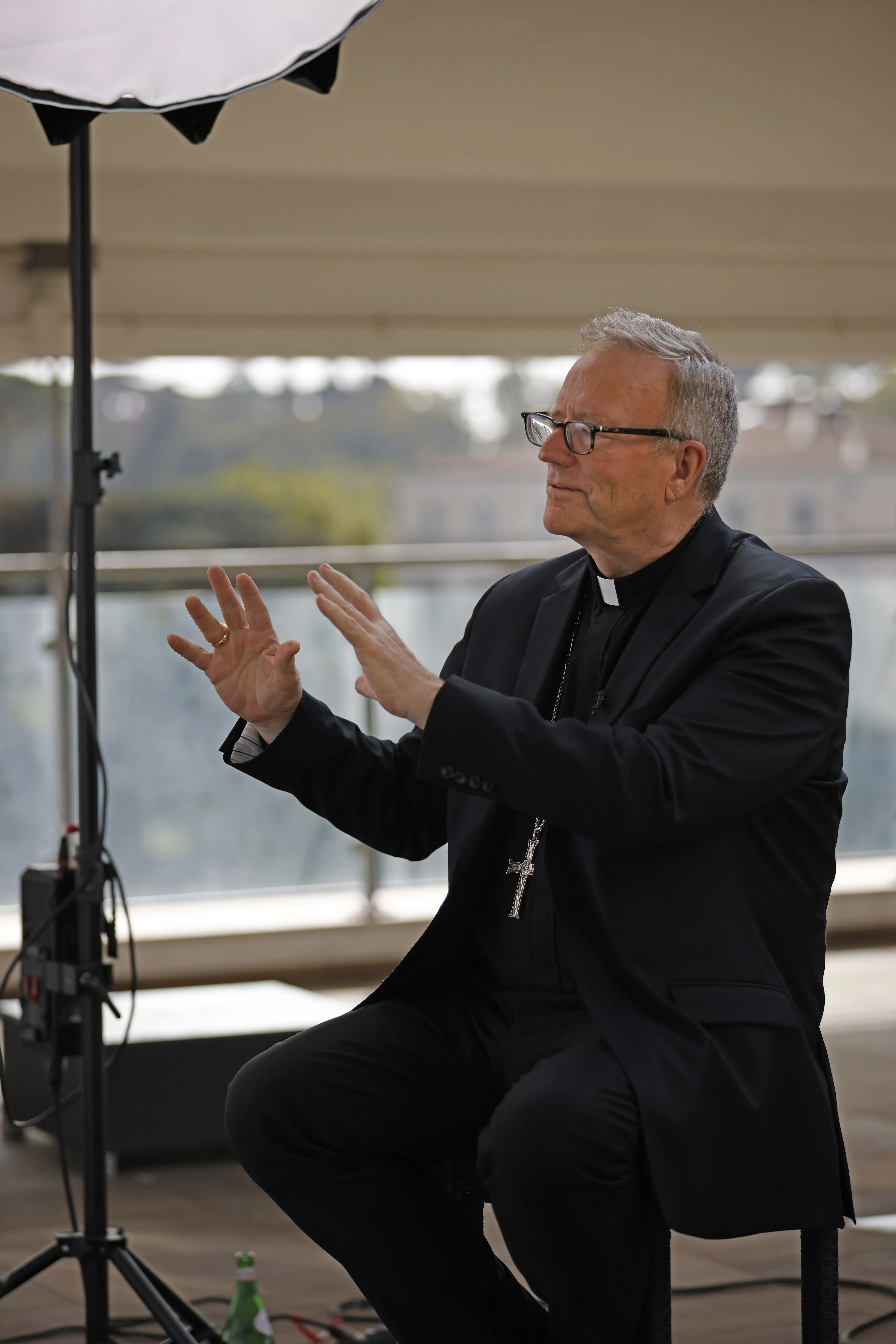 Bishop Robert Barron speaks to EWTN’s Colm Flynn about evangelizing the culture today. October 2023. / Credit: Word on Fire
Bishop Robert Barron speaks to EWTN’s Colm Flynn about evangelizing the culture today. October 2023. / Credit: Word on Fire
Vatican City, Oct 26, 2023 / 14:30 pm (CNA).
Bishop Robert Barron said he regrets the Catholic Church’s “hand-wringing” in recent decades over how to share the Christian message with a secular culture.
In an exclusive interview with EWTN News this week, the 63-year-old bishop of Winona-Rochester said he wants to see the Church today embrace sharing the Gospel with the same gusto and confidence as when Sts. Peter and Paul evangelized Rome.
“Much of my adult life — and I say this with regret — the Church has been in a kind of hand-wringing mode of, ‘Well, what do we know, and who are we to tell you? And we’re here, really, to learn more from you.’ Come on!” Barron said during an interview at the North American College in Rome.
“Peter and Paul came to this town a long time ago and they weren’t here just to listen to Roman culture,” the bishop continued. “They were here with a message: ‘euangelion,’ there’s good news, and it’s good news that will change the world. And in fact it worked.”
“The fact that over there [St. Peter’s Basilica], Peter lies buried to this day, but dominating this once imperial capital is the cross of Jesus. That didn’t come welling up from Roman culture. That came from a message that these [apostles] brought. We should do our work with the same energy and the same panache and the same confidence,” Barron encouraged.

Barron, founder of the Word on Fire media apostolate, is in Rome to participate in the Oct. 4–29 session of the Synod on Synodality.
He said despite the apparent decline in faith and rise in what have been described as spiritual “nones” — people with no belief whatsoever — he still has hope in Christ and in the message of the Catholic Church.
“Being here in Rome with the synod, every day, people from all corners of the world — well, that means there’s something in Catholicism that is still very compelling to people, and that when it’s laid out in a way that’s intellectually satisfying and aesthetically pleasing and morally compelling, they respond to it,” he argued.
The bishop said he does not believe the “new atheist nonsense” will hold people’s hearts and minds in the long run.
“And the Church?” Barron added. “I look out at the city of Rome here: [The Church has] been around for a long time and we’ve been through a lot worse than we’re going through right now. So we will endure.”
“So Christ gives me hope and the Holy Spirit gives me hope,” he said. “We’ve been through a lot worse and there’s still nothing better on the table. There’s no fresher fish on the market than Christianity. It’s still the most beautiful, compelling message that we’ve got.”
The popular speaker and writer also said he does not think disagreements in the Church are worse than they were in the ’60s, ’70s, or ’80s.
People are not only critical of Pope Francis, he said, noting that Pope John Paul II and Pope Benedict XVI were also attacked during their papacies, though without social media so it may not have been as much on people’s radars.
Barron also attended the Synod of Bishops on young people in October 2018.
Practically speaking, he said, the synodal assembly this month is more comfortable than the youth synod.
Prior synods were held in the Vatican’s New Synod Hall, which has theater-like seating. Barron described it as “a somewhat claustrophobic room” and like sitting in “the middle seat on an airplane.”
He added that the larger space of the Paul VI Hall, with tables and chairs, as well as wearing suits instead of cassocks every day, is also “more comfortable, more humane … easier to get through.”
“The best part of [the Synod on Synodality]” is being with Catholics from all over the world, he said.
He recalled the “cacophonous sound” of hundreds of people speaking in different languages at the three-day retreat held ahead of the synodal assembly in a town outside Rome.
“It was the universality of the Church in all of us,” he said, “a kind of cacophonous wonder. There’s no other group or society in the world, I don’t think, that could muster that kind of international universality, and that is an extraordinary thing.”
Watch EWTN’s full interview with Bishop Barron below.
